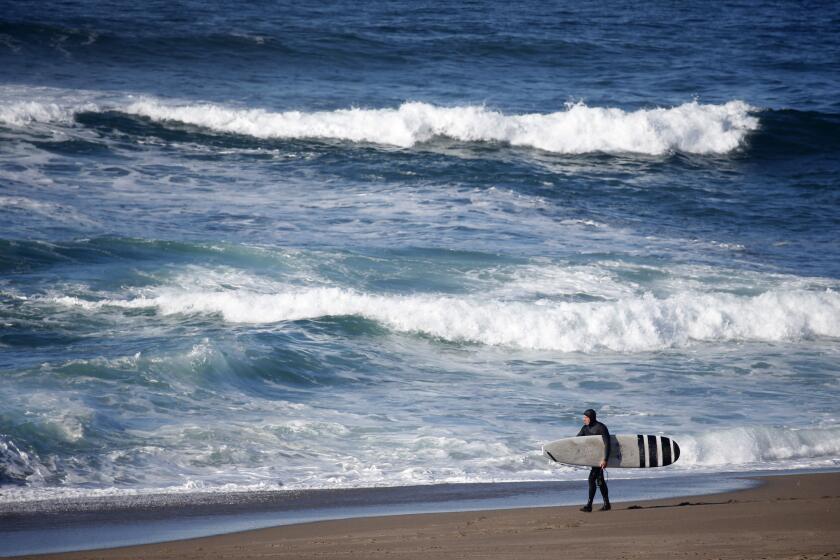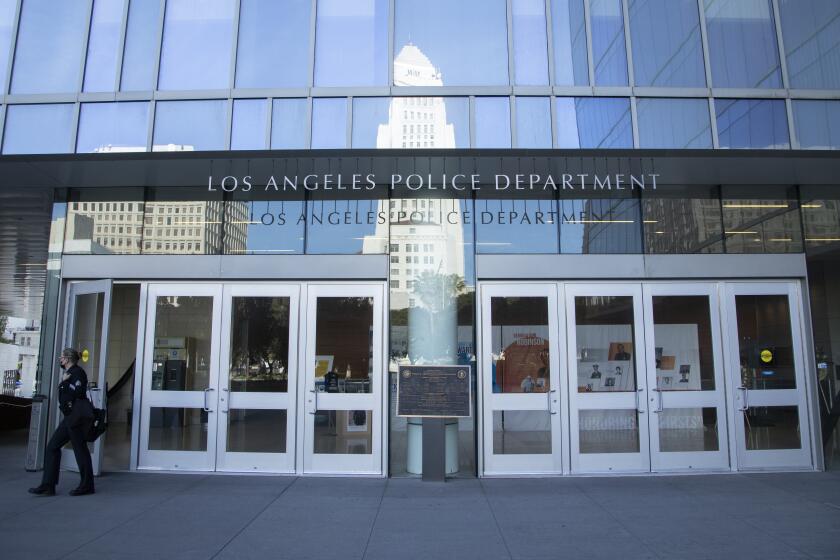Biker group escorts fallen troops
EL CAJON, Calif. -- Clad in black leather vests, jeans, boots and bandannas, the bikers stood at attention as pallbearers carried the casket of Army Staff Sgt. Sean P. Fisher inside St. Kieran Catholic Church.
Fisher, 29, who was killed Aug. 14 in a helicopter crash in Iraq, did not know any of these particular mourners, but that did not matter to any of them. They were at the service to show respect, hoist the American flag and support Fisher’s family.
“We are here for the young men and women who paid the ultimate price,” said Doyle Tolbert, 64, a retired narcotics officer from Fontana.
Tolbert belongs to the Patriot Guard Riders, an informal, national organization of motorcycle enthusiasts who attend funerals to pay tribute to fallen U.S. military personnel.
The group sprung up in Topeka, Kan., in August 2005, at first to shield grieving relatives from protesters belonging to Westboro Baptist Church, a fundamentalist congregation in town that pickets soldiers’ funerals. Now the riders try to focus their energy more on honoring the dead.
The group says that tens of thousands of motorcyclists nationwide have participated in services as members of the Patriot Guard Riders. They include men and women from all walks of life, including former police officers and postal workers, as well as housewives.
For Tolbert and other riders in California, attending the services means traveling all over the state.
Among the bikers are Gold Star parents -- those who have lost a child in the military service to war; and Blue Star parents, who have a child currently serving. The riders’ range from teenagers to pensioners. Some are war veterans. Although most ride motorcycles, some drive cars. They all want to show they care.
“It doesn’t matter whether you support or don’t support the war,” said Jeff Lockhart, 35, national communications officer for the group and a former ride captain for the members in Illinois. “Even if you’re antiwar, at the point where we get involved in a solder’s life, it doesn’t matter.”
Craig “Gunny” Donor, 62, a ride captain from Fontana, receives the Defense Department’s media releases on casualties and then communicates with the appropriate casualty assistance officer dealing with a service member’s burial in California. The group relies on the assistance officers to inform the families about the riders, Donor said.
Typically, the bike riders and the few cars in their entourage escort the casket from the church to the cemetery. Police and the funeral home set the route. The riders may assist police with traffic at intersections. Sometimes the riders meet the body at the airport and accompany it to the funeral home for viewing.
The riders usually present the families of the fallen service members with mini dog tags -- green for Army personnel, blue for the Navy and red for the Marine Corps. The tags are typically inscribed with the service member’s name, age, rank and country of death.
Donor, a former gunnery sergeant who served in the Marine Corps for 20 years, said the riders’ main goal is to help things go smoothly on the day of the funeral. He said they are always prepared for trouble, but seek to avoid confrontation.
Donor recalled that protesters representing the Westboro group showed up at funerals he attended in Hawthorne and Torrance.
Typically, the bikers create a human wall by turning their backs to the demonstrators, linking arms and holding up American flags to keep them out of view. When the protesters shout insults, the riders may bellow patriotic songs, such as “God Bless America,” or rev their motorcycle engines to drown out the sound.
Shirley L. Phelps-Roper, an attorney for Westboro Baptist Church, called the Patriot Guard “bitter bikers.” Military funerals were the perfect venue to convey the Westboro message that “America is doomed,” and the riders were “a harbinger” of the destruction, she said.
“Everything they try to do to try and shut us up and get us to go away draws attention to us,” said Phelps-Roper, who spoke by phone from Topeka, where the church is headquartered. “Everyone who sees them thinks of us because they know why they are there.”
The service for Fisher, of Santee, Calif., who was among five soldiers fatally injured when their CH-47 Chinook helicopter crashed during a post-maintenance test flight, did not attract protesters. About 30 riders attended his funeral Aug. 24.
In the courtyard outside the service, Fisher’s brother, David Reade, met Donor, a stocky man with a handlebar mustache and a quick smile. The two strangers hugged.
“You guys are awesome in what you do,” said Reade, who considers the riders “a band of brothers.”
“It’s our honor sir,” Donor replied, looking Reade straight in his eyes. “Anything we can do, just let us know.”
Tolbert, who said he served three tours in Vietnam and a tour on the Pakistan-Afghanistan border in the early 1960s, said he puts everything else aside so he can attend the funerals of fallen California service members.
“If [the family] can look at me and for one instant have the pain taken away, I feel I would have done something to help them,” he said.
Such compassion deeply touched Vernon Torres of Alpine, Calif., whose stepson, Army Sgt. Joseph W. Perry, 23, was killed by a sniper in southern Baghdad last October. Dozens of riders attended the funeral for Perry, and the outpouring of love from strangers overwhelmed Torres and his wife, Kristen Yuhl. Shortly after, Torres bought a Harley-Davidson and joined the group.
“It’s a privilege and an honor, and it’s a way of remembering and honoring our sons,” he said.
Bridget Madison also became involved with the riders after a personal loss. Her 20-year-old son, Army Spc. Spencer T. Karol, was killed in Iraq in October 2003, leaving her grief-stricken.
Madison, 52, said she attended her first funeral with the riders in winter 2006 and that the experience helped her begin healing. Now she typically takes up the rear of the bikers’ convoy, driving a white GMC pickup truck adorned with photos of and tributes to her deceased son.
Tanna Toney-Ferris of Chula Vista, Calif., a homemaker whose husband is a Navy veteran, said the bottom line for the riders, no matter what personal relief they get as members of the bikers’ group, is to honor the service people and their families.
If it makes the families “feel more secure, or keeps a little bit of their heart from breaking to see all these strangers,” she said, “that’s good.”
When word came that Fisher’s memorial service was ending, Donor and the others -- who had taken shade under trees in the church’s courtyard -- quickly lined up along the walkway, their motorcycles lined up nearby. Moments later, they mounted their bikes, with three riders assuming a “missing man” formation around the hearse -- leaving a space at the right rear of the vehicle.
Traffic slowed or gave way as the police-led convoy roared west along the 8 Freeway to Ft. Rosecrans National Cemetery on San Diego’s Point Loma, where Fisher was buried.
Donor later said, “If people stop to put a hand over their heart, it practically brings tears to my eyes.”
--
More to Read
Start your day right
Sign up for Essential California for news, features and recommendations from the L.A. Times and beyond in your inbox six days a week.
You may occasionally receive promotional content from the Los Angeles Times.







